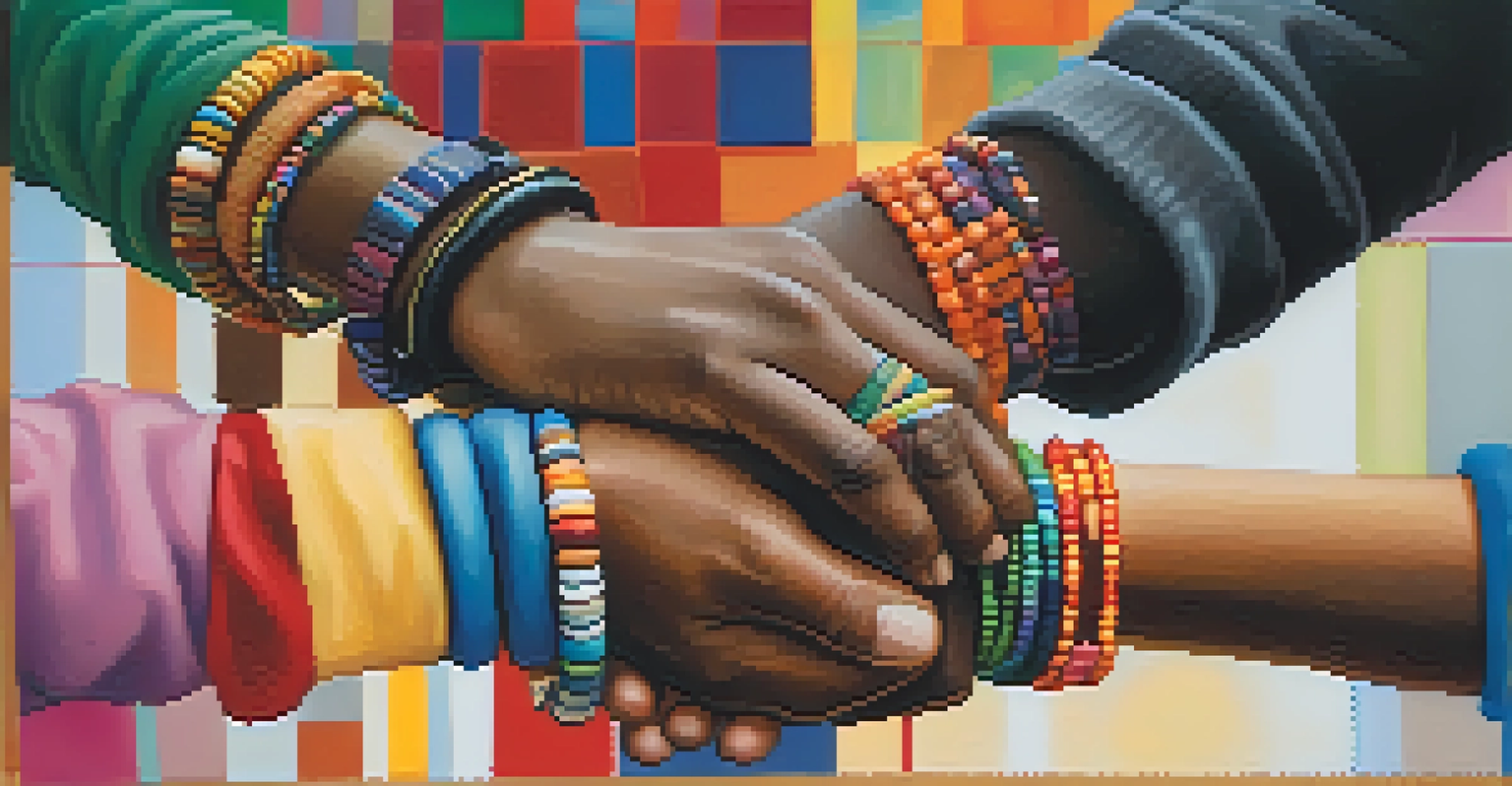The Importance of Empathy in Understanding Diverse Cultures

Empathy as a Bridge Between Cultures
Empathy acts as a bridge, connecting individuals from diverse backgrounds. It allows us to step into someone else's shoes and see the world through their eyes. This understanding is essential in a multicultural society, where miscommunication can easily arise.
Empathy is about finding echoes of another person in yourself.
When we embrace empathy, we cultivate a sense of belonging and acceptance. This not only enriches our lives but also promotes harmony within communities. Imagine attending a cultural festival and feeling the warmth of connection as you learn about traditions different from your own.
Ultimately, empathy helps dissolve the barriers that often separate us, paving the way for deeper conversations and interactions. By fostering this quality, we create an environment where diversity is celebrated and appreciated.
The Role of Active Listening in Empathy
Active listening is a crucial component of empathy, as it involves fully engaging with another person's perspective. When we listen actively, we not only hear the words but also grasp the emotions and experiences behind them. This creates a genuine connection that is vital for understanding diverse cultures.

For example, consider a conversation with a colleague from a different background. By focusing on their stories and asking open-ended questions, you can gain insights into their unique cultural experiences. This not only enriches your own understanding but also shows respect for their individuality.
Empathy Connects Diverse Cultures
Empathy serves as a bridge that fosters understanding and connection among individuals from different backgrounds.
In today’s fast-paced world, we often rush through conversations. However, taking the time to practice active listening can transform our interactions and lead to more meaningful relationships across cultures.
Cultural Awareness and Empathy
Cultural awareness is the foundation upon which empathy is built. Understanding the customs, values, and beliefs of different cultures allows us to approach interactions with sensitivity and respect. By being aware of cultural nuances, we can respond appropriately and avoid misunderstandings.
The highest form of knowledge is empathy.
For instance, in some cultures, direct eye contact signifies confidence, while in others, it may be perceived as disrespectful. Recognizing these differences is crucial when navigating cross-cultural interactions. It’s like learning a new language; the more you understand it, the better you can communicate.
Thus, fostering cultural awareness enhances our empathetic abilities, allowing us to appreciate the richness of diversity. It encourages us to celebrate differences rather than shy away from them.
Empathy and Conflict Resolution
Empathy plays a pivotal role in resolving conflicts, particularly those rooted in cultural misunderstandings. By understanding the emotions and perspectives of all parties involved, we can find common ground and foster constructive dialogue. This approach transforms potential clashes into opportunities for growth.
Imagine a workplace dispute between team members from different cultural backgrounds. By encouraging empathetic conversations, both sides can express their views and feel heard. This not only resolves the immediate issue but also strengthens team dynamics in the long run.
Active Listening Enhances Empathy
Engaging in active listening allows us to genuinely connect with others' experiences and perspectives.
In essence, empathy equips us with the tools to navigate conflicts with compassion and understanding, ultimately leading to a more harmonious coexistence.
The Impact of Empathy on Personal Growth
Engaging with diverse cultures through empathy can profoundly impact our personal growth. It challenges our assumptions and broadens our perspectives, making us more open-minded individuals. This growth is essential in an increasingly globalized world, where we encounter different cultures daily.
By embracing empathy, we learn to appreciate the beauty of diversity. Each interaction becomes a chance to learn something new, whether it’s a different way of thinking or a unique tradition. This continuous learning process enriches our lives and enhances our ability to connect with others.
Ultimately, personal growth through empathy fosters resilience and adaptability, qualities that are invaluable in today’s fast-paced society.
Practicing Empathy in Everyday Life
Practicing empathy doesn’t require grand gestures; it can be woven into our daily interactions. Simple acts, like showing kindness or being open to different viewpoints, create a culture of empathy in our communities. For instance, making an effort to learn about a colleague's cultural background can deepen your working relationship.
Additionally, volunteering in diverse communities provides firsthand experience and connection. Engaging in these environments allows us to see the world through different lenses, increasing our empathy. It's like adding new colors to your palette; the more you add, the richer the picture becomes.
Cultural Awareness Builds Respect
Understanding cultural nuances enhances our ability to empathize and fosters respectful interactions.
As we make empathy a habit in our everyday lives, we contribute to a more understanding and compassionate society.
The Future of Empathy and Cultural Understanding
As we look to the future, the importance of empathy in understanding diverse cultures will only grow. In an interconnected world, the ability to empathize with others is crucial for fostering global cooperation and peace. The next generation will face challenges that require a deep understanding of cultural dynamics.
Educational institutions are beginning to prioritize empathy training, preparing students to navigate cultural complexities. By instilling these values early on, we can create a future where empathy is at the forefront of human interactions. It’s like planting seeds for a garden that will bloom with understanding and respect.

In conclusion, as we cultivate empathy, we pave the way for a more inclusive and harmonious world, where every culture is valued and understood.